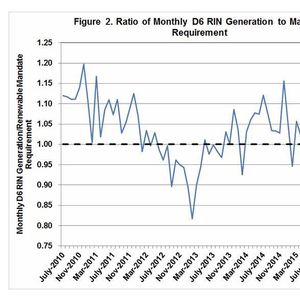Q3 RINs update suggests sufficient supplies for all but D3

FarmDoc Daily
November 14, 2016
BY Susanne Retka Schill
While earlier quarterly updates suggested potential deficits of renewable identification numbers (RINs) to use for showing compliance with the 2016 mandate targets, the pace of RIN generation has increased, writes University of Illinois economist Nick Paulson in a recent 2016 3rd Quarter RIN Update published in the FarmDoc Daily.
“Updated projections for net generation continue to suggest a deficit of 50 million to 60 million RINs available to meet the 230 million gallons cellulosic mandate,” Paulson found. Though cellulosic D3 RINs are likely to fall short, projections indicate that D3 (renewable diesel), D5 (advanced) and D6 (conventional renewable fuel, primarily corn ethanol) will be sufficient.
In his analysis, Paulson reviews previous quarterly updates, bringing them up to date with most recent RIN generation figures, combined with RIN retirement data from EMTS, ethanol and biodiesel export data.
Advertisement
Because the renewable volume obligations are actually percentage-based target, the actual required RIN amounts for D4, D5 and D6 RINs are likely to exceed the U.S. EPA’s 2016 targets as expressed in gallons, Paulson added. “With lower crude oil prices, fuel consumption in the U.S. has been surpassing the EPA estimates upon which the percentage-based renewable volume obligations (RVO) applied to obligated parties were based. This will tend to increase the actual mandate volumes above the targets outlined in the rulemaking.” To see the complete update, click here.
Advertisement
Related Stories
Keolis Commuter Services, the Massachusetts Bay Transportation Authority’s operations and maintenance partner for the Commuter Rail, has launched an alternative fuel pilot utilizing renewable diesel for some locomotives.
Virgin Australia and Boeing on May 22 released a report by Pollination on the challenges and opportunities of an International Book and Claim system for sustainable aviation fuel (SAF) accounting.
The biodiesel industry has been facing turbulence, but the release of long-overdue policy could course-correct.
The U.S. House of Representatives early on May 22 narrowly passed a reconciliation bill that includes provisions updating and extending the 45Z clean fuel production tax credit. The bill, H.R. 1, will now be considered by the U.S. Senate.
U.S. EPA Administrator Lee Zeldin on May 21 stressed the agency is working “as fast as humanly possible” to finalize a rulemaking setting 2026 RFS RVOs during a hearing held by the U.S. Senate Committee on Environment and Public Works.
Upcoming Events










